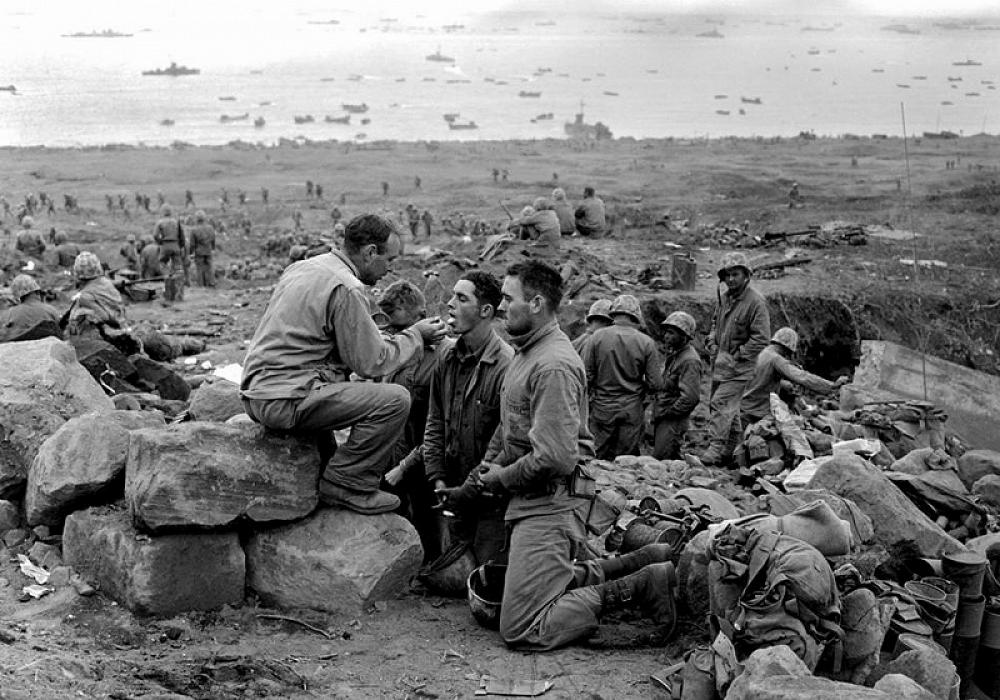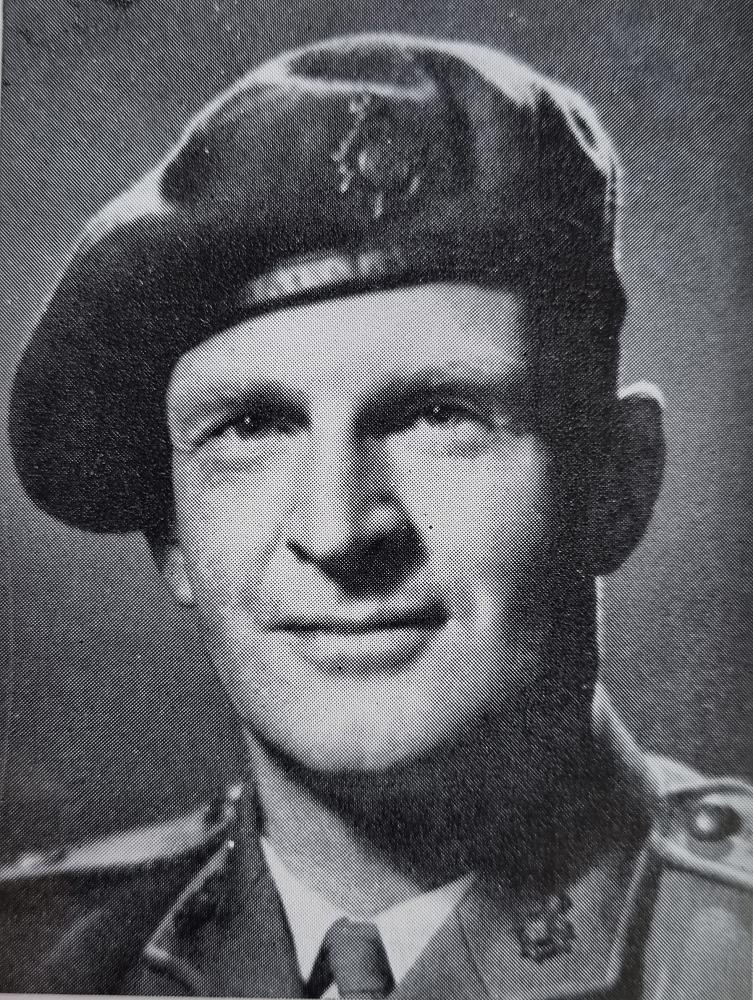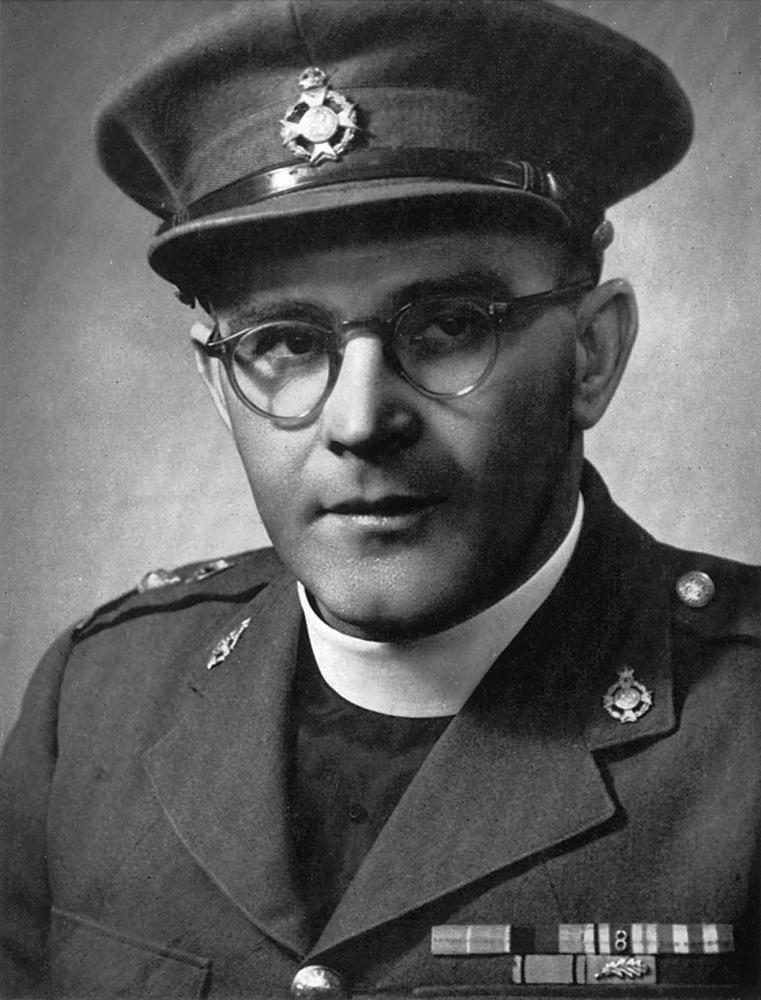
Reflections
Chaplains in WW 2
Unlike the other men in war, a Chaplain is there to serve not only his country, but also God. He is usually described as a man of quiet courage, who goes about his business helping those in need of courage as they face the brutalities of the front line. Not only does the Chaplain hear confessions, give courage where needed and pray for the dead, but they are usually the men who must identify the dead, collect the personal items from their pockets and the identification tags from around their necks. While a Chaplain's fellow men would help to dig the graves, there were few who were prepared to do the work the Chaplains had to do.
St Bede’s had a number of Old Boys who had the role of Chaplain during WW 2, there was Captain-Chaplain Frank Walsh, with the 2nd NZEF. Also attached to the 2nd NZEF, but in the Pacific was Major-Chaplain Jack Pierce. Flight Lieutenant Chris Feehley was with the RNZAF and Chaplain Captain Harry Smith with the AIF. There was also Chaplain Captain Jim Wall with the Solomon Missions and later with a chaplaincy with the American Forces.
This month's Reflection's piece is from the memories of two other St Bede's Old Boys who went to WW 2 in the role of Chaplain, Chaplain Major Jesse Kingan SM MC and Lieutenant Colonel Leo Spring SM OBE .

Chaplain-Major J L Kingan was born in Tai Tapu in 1901 and attended St Bede’s from 1916-1919. He returned briefly in 1924 for Latin instruction, before entering the seminary in 1925 and being ordained in1929. At the outbreak of WW 2, he was a Chaplain at Trentham and in 1941, left for the Middle East, going on to work in North Africa and Italy. He was mentioned in dispatches in 1943 and a few months later, was awarded the Military Cross, for bravery under fire in the Tunisian campaign. As Freyburg pinned the medal to Kingan’s lapel, his citation was as follows:
“his invaluable service to the general comfort and welfare to the wounded in the Brigade Advanced Dressing Station” and “his cheerful demeanour which was a constant inspiration to the wounded and those who cared for them. It is noted he visited men in their forward positions often under fire and never allowed danger or fatigue to interfere with his work”.
A keen rugby enthusiast, Kingan was instrumental in setting up Rugby games known as Internationals, for soldiers from different countries to play against each other. In 1944, while carrying out duties, he was badly wounded in the arm and sent back to Trentham for what was to be a long recovery. He was a ‘Man’s man”, who cut an imposing figure where ever he went, he was admired by all, no matter what their religion was.
Fr Kingan himself said the following “A Priest as a Chaplain is in a unique position to judge the calibre of his men. There is no one to whom they reveal themselves more frankly; there is no one who sees more clearly their mental attitude to the harassing ordeals and hardships of war”.
He said at the Silver Jubilee: “For us, Fellow-Bedeans, the future is much more important than the past. The past is gone. But ours is the duty to see that the sufferings and sacrifices of the past have not been in vain”.

Another Old Boy who went to war in the role of Chaplain, was Fr Leo Spring, also born in 1901. He attended Timaru Boys’ High School and in fact did not become a student at St Bede’s until he was 20 years old. He could not compete in anything athletic for the school, it was his long years of mastering Latin that brought him and kept him at St Bede’s. While he may not have been academic, he did have other commendable traits, the fact that he was a man of “inspirational calmness in the storm”. This was put to the test first when he was in the Earthquake of 1931 in Napier at GreenMeadows and as master of manual labour, he was “hero of the hour”, giving practical assistance.
At the beginning of 1940, he was accepted for Chaplaincy work and sailed with the First Echelon, a South Island contingency, made up of the 20th Infantry Battalion under Lt Col Kippenberger, some of the Army Service Corps and Reserve Motor Transport, the 4th Field Ambulance and Fr Spring’s own unit, the 27th Machine Gun Battalion, they left on two ships, the Dunera and the Polish Sobieski, on which Fr Spring had a berth. They sailed to Maadi, a few miles just near Cairo and while sailing there, Fr Spring converted 5 men to Catholicism, baptising them in his bathroom sink. In his time as a Chaplain in the war, he baptised at least 74 men. Fr Spring was to travel through much of the war, once on Palm Sunday, he gave Mass half way down Mt Olympus, while on the run. During his time, he came across many St Bede’s Old Boys and spoke of their courage. Of Fr Jesse Kingan, he said “he was the ideal Chaplain and his Military Cross was well merited”.
When Fr Spring became a war Chaplain in 1939, his first post was to Burnham, where he gave Mass to 250 soldiers. His recollection of that Mass “is the elevation of the Chalice at the Consecration. As my eyes followed the Chalice, I beheld that khaki-clad group reflected in the bowl. It was a sight never to be forgotten: the bowed heads of the soldiers above the golden flowers of the wild turnips mirrored in the Cup that contains the Mystery of Faith”. With that, Fr Spring took it as a sign that it is the Mass that matters to the soldiers. While in Rome, he attended his first Mass in St Peter’s, which he said “was a far cry from Mass in the wild Turnips at Burnham”.
Fr Leo Spring returned home in 1946, with a heart full of gratitude, “gratitude that for more than 6 years, he had been able to serve the troops without a day’s illness and without accident”.
He said “to live so close to men in wartime, to share their joys and sorrows adds something to the peace time work of a Priest. I should like to close with a salute to the men we served.”
And so, these were the words of two men, both Old Boys of St Bede’s. They went to war, to serve their country, to serve God. They supported others through the darkest times. Their inner strength gave others strength and their quiet courage gave others courage. They were the calm for men who found themselves in the middle of a worldwide storm.
